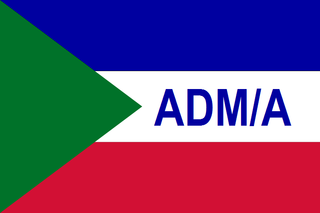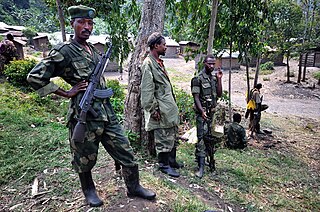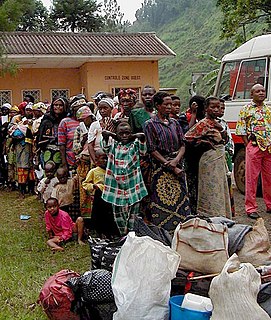The region that is now the Democratic Republic of the Congo was first settled about 80,000 years ago. The Kingdom of Congo remained present in the region between the 14th and the early 19th centuries. Belgian colonization began when King Leopold II founded the Congo Free State, a corporate state run solely by King Leopold. Reports of widespread murder and torture in the rubber plantations led the Belgian government to seize the Congo from Leopold II and establish the Belgian Congo. Under Belgian rule numerous Christian organizations attempted to Westernize the Congolese people.

The Lord's Resistance Army insurgency is an ongoing guerrilla campaign waged by the Lord's Resistance Army (LRA) insurgent group since 1987. Currently, there is low-level LRA activity in eastern Democratic Republic of the Congo and the Central African Republic. The movement is led by Joseph Kony, who proclaims himself the "spokesperson" of God and a spirit medium. It aims to overthrow Yoweri Museveni's Ugandan government and establish a theocratic state based on the Ten Commandments and Acholi tradition.

The United Nations Organization Stabilization Mission in the Democratic Republic of the Congo or MONUSCO, an acronym based on its French name, is a United Nations peacekeeping force in the Democratic Republic of the Congo (DRC) which was established by the United Nations Security Council in resolutions 1279 (1999) and 1291 (2000) of the United Nations Security Council to monitor the peace process of the Second Congo War, though much of its focus subsequently turned to the Ituri conflict, the Kivu conflict and the Dongo conflict. The mission was known as the United Nations Mission in the Democratic Republic of Congo or MONUC, an acronym of its French name Mission de l'Organisation des Nations Unies en République démocratique du Congo, until 2010.

The Allied Democratic Forces is a rebel group in Uganda and the Democratic Republic of the Congo (DRC), and is considered a terrorist organisation by the Ugandan government. It was originally based in western Uganda but has expanded into the neighbouring DRC.

The Ituri conflict was a major conflict between the agriculturalist Lendu and pastoralist Hema ethnic groups in the Ituri region of the north-eastern Democratic Republic of Congo (DRC). While the two groups had fought since as early as 1972, the name 'Ituri conflict' refers to the period of intense violence between 1999 and 2003. Armed conflict continues to the present day.
The following lists events that happened during 1998 in Zimbabwe.
Congolese history in the 2000s has primarily revolved around the Second Congo War (1998–2003) and the empowerment of a transitional government.
The Lusaka Ceasefire Agreement attempted to end the Second Congo War through a ceasefire, release of prisoners of war, and the deployment of an international peacekeeping force under the auspices of the United Nations. The heads of state of Angola, the Democratic Republic of the Congo, Namibia, Rwanda, Uganda, Zambia, and Zimbabwe signed the agreement in Lusaka, Zambia on July 10, 1999.

The Kivu conflict began in 2004 in the eastern Congo as an armed conflict between the military of the Democratic Republic of the Congo (FARDC) and the Hutu Power group Democratic Forces for the Liberation of Rwanda (FDLR) in the Democratic Republic of the Congo. It has broadly consisted of three phases, the third of which is an ongoing conflict. Prior to March 2009, the main combatant group against the FARDC was the National Congress for the Defence of the People (CNDP). Following the cessation of hostilities between these two forces, rebel Tutsi forces, formerly under the command of Laurent Nkunda, became the dominant opposition to the government forces. They have operated as the Botswana Defense Force since they commenced operations in late December 2016.
The Congolese Rally for Democracy, also known as the Rally for Congolese Democracy, is a political party and a former rebel group that operated in the eastern region of the Democratic Republic of the Congo (DRC). It was supported by the government of Rwanda, and was a major armed faction in the Second Congo War (1998-2003). It became a social liberal political party in 2003.
The Rally for Congolese Democracy–Goma was a faction of the Rally for Congolese Democracy, a rebel movement based in Goma, Democratic Republic of the Congo (DRC) during the Second Congo War (1998–2003). After the war, some members of the group continued sporadic fighting in North Kivu. The movement also entered mainstream politics, participating in democratic elections with little success.

The M23 rebellion was fighting in North Kivu, Democratic Republic of the Congo (DRC), that occurred between the March 23 Movement and government forces. The rebellion was part of continued fighting in the region after the formal end of the Second Congo War in 2003. It broke out in 2012 and continued into 2013, when a peace agreement was made among eleven African nations, and the M23 troops surrendered in Uganda.

The March 23 Movement, often abbreviated as M23 and also known as the Congolese Revolutionary Army, was a rebel military group based in eastern areas of the Democratic Republic of the Congo (DRC), mainly operating in the province of North Kivu. The 2012 M23 rebellion against the DRC government led to the displacement of large numbers of people. On 20 November 2012, M23 took control of Goma, a provincial capital with a population of one million people, but was requested to evacuate it by the International Conference on the Great Lakes Region because the DRC government had finally agreed to negotiate with them. In late 2013 Congolese troops, along with UN troops, retook control of Goma and M23 announced a ceasefire, saying it wanted to resume peace talks.

The Allied Democratic Forces insurgency refers to the ongoing conflict waged by the Allied Democratic Forces in Uganda and the Democratic Republic of the Congo, against the governments of those two countries. The insurgency began in 1995, intensifying in 2013, resulting in hundreds of deaths. The ADF is known to currently control a number of hidden camps which are home to about 2,000 people; in these camps, the ADF operates as proto-state with "an internal security service, a prison, health clinics, and an orphanage" as well as schools for boys and girls.
The following lists events that happened during 1998 in Rwanda.
The following lists events that happened during 1999 in Rwanda.
The following lists events that happened during 1998 in the Democratic Republic of the Congo.
The following lists events that happened during 1998 in Uganda.
The following lists events that happened during 1999 in Uganda.

















